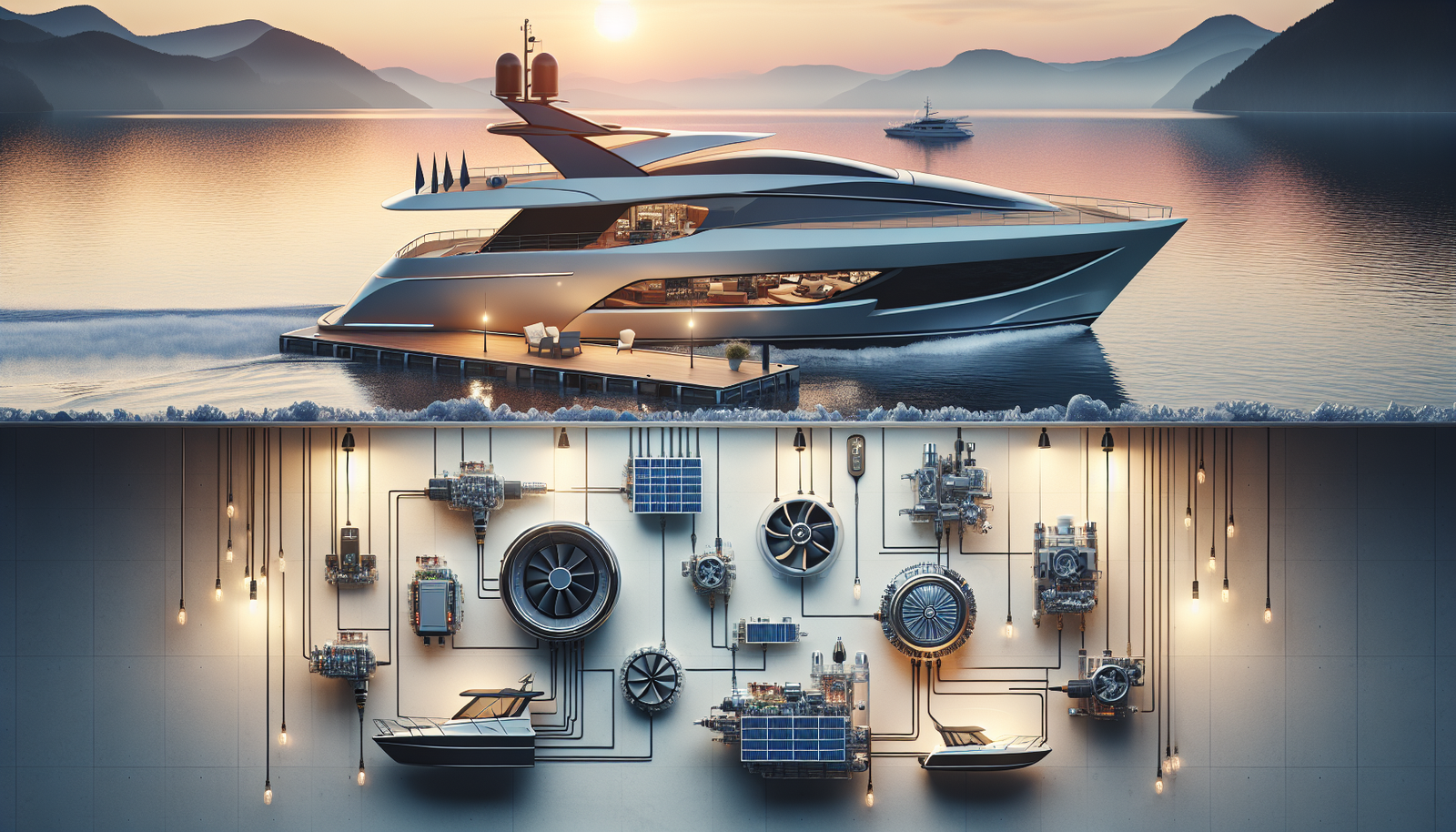Imagine a picturesque day on the water, the gentle lull of the waves, the cool caress of the wind on your face, and the rhythmic pulse of the boat engine beneath you. But wait – wouldn’t it be even better if that boat engine was doing its part to preserve this equally beautiful natural setting as well? In the article “The Best Environmentally-friendly Boat Engine Options,” you’ll encounter an array of choices for greener, cleaner sailing. Rather than spewing harmful pollutants and contributing to environmental degradation, these boat engines boast advanced technology and design that significantly lessen their ecological footprint.
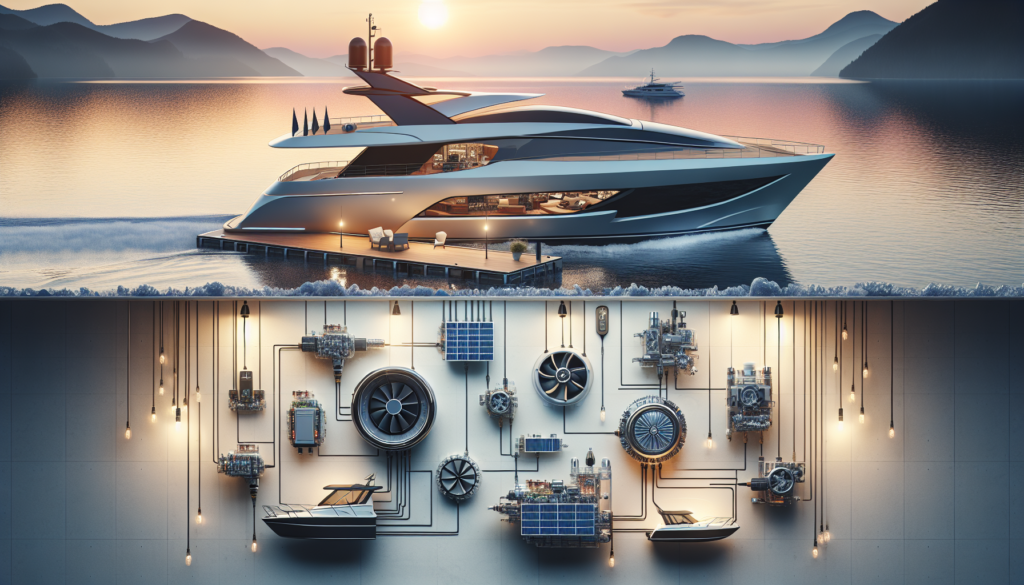
Understanding the Importance of Eco-friendly Boat Engines
Boating is an exhilarating pastime, with the open water providing space for adventure and exploration. However, traditional boating has come at a high cost to our marine ecosystems.
Impact of traditional boat engines on marines ecosystem
Traditional boat engines are notorious for their environmental impact, causing air and water pollution, and threatening marine life. The discharge of oil and fuel from these engines contributes to water pollution and marine habitat degradation. Furthermore, the noise pollution from these engines disrupts underwater ecosystems, impacting the feeding, breeding, and survival of several species.
Sustainable boating: A need for the environment
Given the impact of traditional boat engines, there’s an urgent need for environmentally-friendly alternatives. You have a role to play to protect our oceans and rivers. Sustainable or eco-friendly boating integrates respect for nature by using clean engines that reduce noise, air, and water pollution.
Global regulations and guidelines for boat engines
The global boating community is waking up to this need and there are now international regulations and guidelines promoting eco-friendly boating. These initiatives aim to reduce emissions and promote cleaner technologies such as electric, hybrid, or solar-powered engines. Each country also provides specific regulations concerning the usage of certain types of boat engines.
Hybrid Boat Engines
Becoming eco-friendly shouldn’t compromise your boating experience. Hybrid engines offer an excellent way to reduce pollution while maintaining performance.
How hybrid boat engines work
Hybrid boat engines combine a traditional internal combustion engine with an electric motor. Similar to hybrid cars, the engines are capable of switching between the two modes, drastically reducing fuel consumption and greenhouse gas emissions.
Key advantages of hybrid boat engines: energy efficiency and reduced emissions
With their dual power sources, hybrid boat engines are energy-efficient and result in reduced emissions. They offer excellent performance and flexibility, with an option to run entirely on electric power when you want a quieter, cleaner ride.
Considerations when choosing a hybrid boat engine
While considering a hybrid boat engine, keep some factors in mind. Understand your requirements in terms of speed, duration, and distance to be covered. Hybrid engines are also more complex than traditional ones, leading to potentially higher maintenance costs.
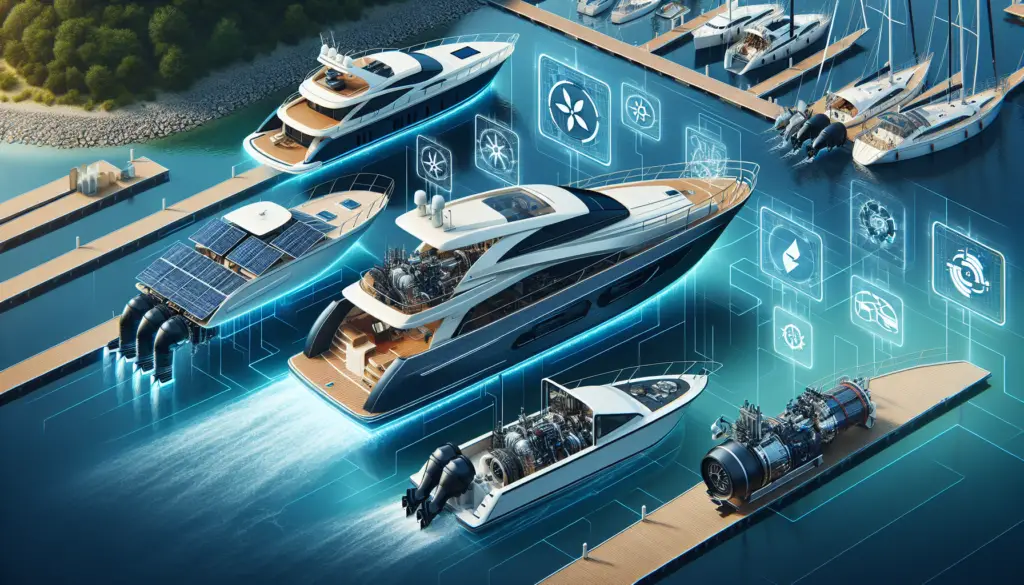
Electric Boat Motors
Moving towards an even cleaner marine environment, let’s look at electric boat motors.
Function and efficiency of electric boat motors
Electric motors function purely on electricity, stored in batteries onboard. They are highly efficient, converting almost 90% of electrical energy into propulsion, whereas traditional boat engines only convert about a third.
Benefits of opting for electric boat motors in terms of sustainability
Using electric motors significantly reduces air and water pollution, and noise pollution too – keeping marine life happy. They’re not only better for marine ecosystems but also for your wallet, with lower fuel costs and lower maintenance costs.
Challenges and solutions when using electric boat motors
There are, however, some challenges to consider. Electric motors do have a limited range due to the current battery technology, however, this is rapidly improving. Portable generators can also provide backup power.
Solar Powered Boat Engines
Harnessing the power of the sun, solar-powered boat engines offer a renewable energy solution for boating.
The function of solar powered boat engines
Solar-powered boat engines use solar panels fitted on the boat to capture sunlight, converting it into electricity to propel the boat. The energy can also be stored in batteries for use when the sun is not shining.
Upsides of using solar as a power source in boating
Using solar as a power source in boating provides numerous upsides. It’s a renewable source of energy and operating costs are virtually non-existent once the solar panels are installed. Moreover, it is quiet and produces zero emissions.
Potential drawbacks and ways to overcome them
On the downside, solar power largely depends on sunlight, meaning it may prove ineffective during cloudy weather or at night. However, energy can be stored in batteries to ensure continuous operation. Moreover, newer solar technologies are more efficient in energy capture, offering higher power output.
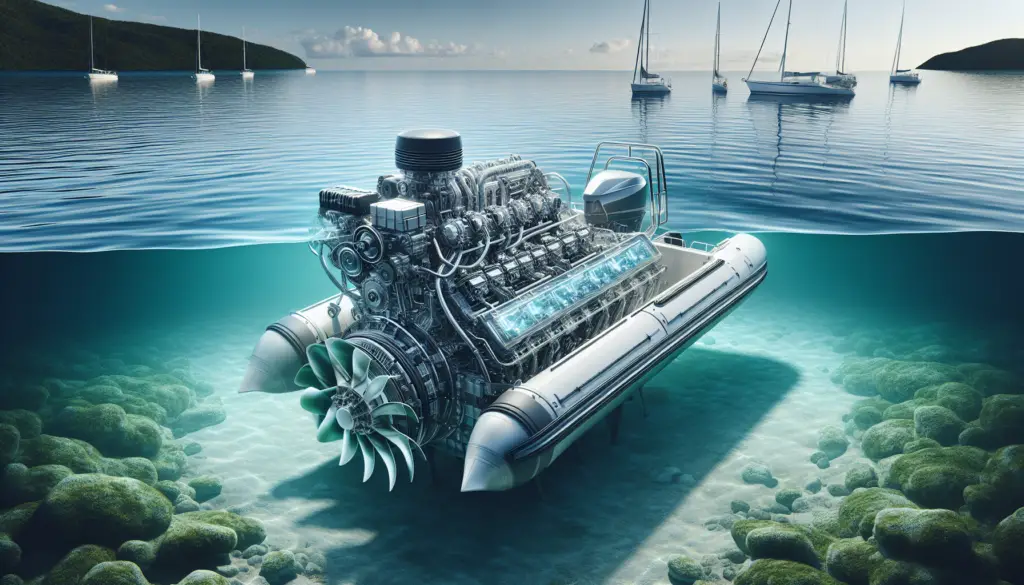
Propane Outboard Boat Engines
Let’s move on and explore another eco-friendly option – propane outboard boat engines.
Operation of propane outboard engines
Propane engines are an increasingly popular choice among environmentally-conscious boaters. Just like a barbecue gas grill, these engines use propane stored in tanks to power the boat.
Environmentally benefits of propane boat engines
Propane is a remarkably clean-burning fuel. Its use results in far fewer emissions than gasoline, protecting air and water quality. Additionally, propane doesn’t degrade or contaminate water if there’s a spill, making it safer for marine life.
Selection criteria for propane outboard engines
When selecting a propane engine, consider your boating needs. While propane engines are suitable for smaller, portable boats, they may not be the best option for larger vessels.
Bio-Diesel Boat Engines
Another alternative fuel is bio-diesel – let’s dive into this topic.
Concept of bio-diesel in boating
Bio-diesel is produced from organic materials such as plant oils, animal fats, or recycled grease. It’s a renewable source of energy that can be used in boat engines without any modifications.
Why bio-diesel is an environmentally-friendly option
Bio-diesel is carbon-neutral, meaning the carbon dioxide released when it’s burned is absorbed by the plants that are used to produce it. It also produces fewer harmful emissions and is biodegradable, reducing the impact of spills.
Factors to consider when transitioning to bio-diesel boat engines
When transitioning to bio-diesel, ensure your boat engine is compatible and that the bio-diesel is of high quality. As bio-diesel is not as readily available as gasoline, plan your trips keeping the availability of the fuel in mind.
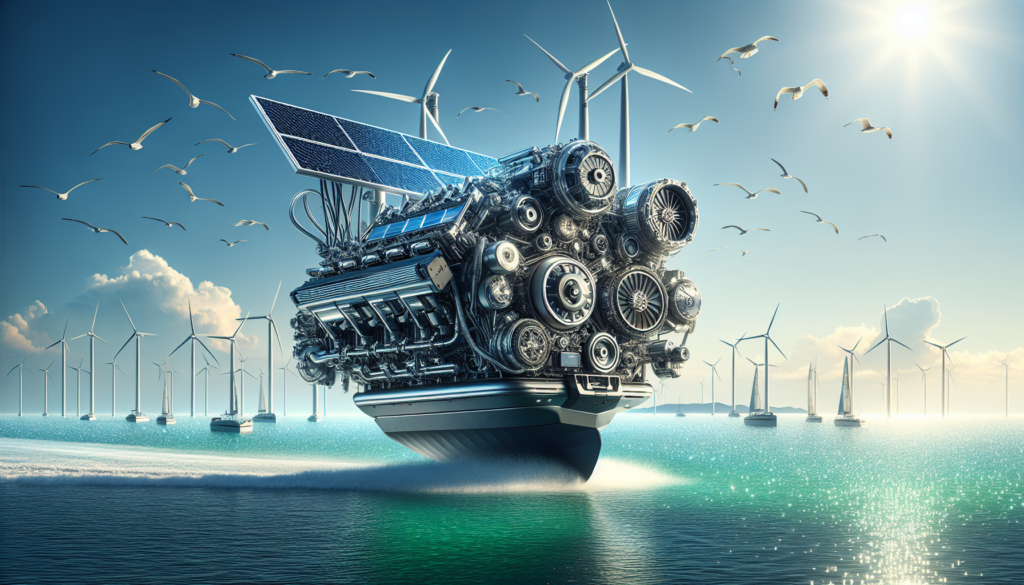
Hydrogen Fuel Cells for Boats
Now, let’s explore the potential of Hydrogen Fuel Cells in boats.
Understanding how hydrogen fuel cells work
In a hydrogen fuel cell, hydrogen and oxygen are combined to produce electricity, water, and heat. These fuel cells are efficient, quiet, and produce zero emissions except for water.
Environmental impact of hydrogen fuel cell boats
Hydrogen fuel cell boats offer massive potential to reduce marine pollution. They are a clean technology, with water being the only by-product.
Implementation and challenges of hydrogen fuel cells in boat engines
The implementation of hydrogen fuel cells in boats is still in its early stages. The challenges include developing efficient storage for hydrogen and increasing the availability of hydrogen fuel. That being said, technological advancements are beginning to overcome these hurdles.
Air Lubrication Systems
Another technology to enhance your boat’s efficiency and reduce its pollution is Air Lubrication Systems.
How air lubrication systems enhance engine efficiency
Air lubrication systems use air to create a layer of bubbles along the boat’s hull, which reduces drag and improves fuel efficiency.
Reduction of carbon footprint with air lubrication systems
With better fuel efficiency, boats equipped with air lubrication systems considerably reduce their carbon footprint. This means less greenhouse gas emissions and a smaller environmental impact.
Choosing and implementing air lubrication systems
Implementation of air lubrication systems largely depends on the type and size of the boat. Consult a professional to choose a system that best fits your boat and meets your needs.
Importance of Regular Engine Maintenance
Even with the most eco-friendly engines, regular maintenance remains essential.
The role of maintenance in reducing environmental impact
Regular engine maintenance ensures your boat operates optimally and as environmentally-friendly as possible. It helps reduce fuel consumption and the leakage of harmful substances into water bodies.
Best practices for eco-friendly engine maintenance
Maintain your engine regularly. Use environment-friendly cleaners and oils for maintenance and repair. Also, correct disposal of waste oil and materials is crucial for reducing pollution.
Signs that your boat engine requires maintenance
Know the signs your engine needs maintenance. They can include decreased performance, the unusual smell of exhaust fumes, or unexpected noises. Regular checks are critical for the longevity and efficiency of your boat.
Looking Towards the Future: Emerging Technologies in Eco-Friendly Boating
Get ready to embrace the future of boating and learn how emerging technologies can shape a more sustainable boating environment.
Potential of algae-based biofuel in boating
Algal biofuel is seen as the future of boating. Algae, a renewable and abundant resource, can be converted into biofuel. It’s a carbon-neutral and environmentally-friendly fuel that’s promising for the boating community.
Reducing ecological footprint with energy recovery systems
Another exciting technology is energy recovery. Innovations are enabling boats to recover energy from waves, the sun, wind, and even water drag – greatly reducing their ecological footprint.
Integrating AI for efficiency and sustainability in boating
Intelligence systems are also entering the boating world. They can optimize a boat’s energy use, route, and speed, enhancing efficiency and sustainability of your boating experience.
Remember, every little helps in creating a sustainable future for our planet. By embracing these eco-friendly boat engines and maintenance practices, you’re playing a vital role in protecting our marine ecosystems. Let’s continue to sail and explore, but always with respect for the environment. Happy boating!

